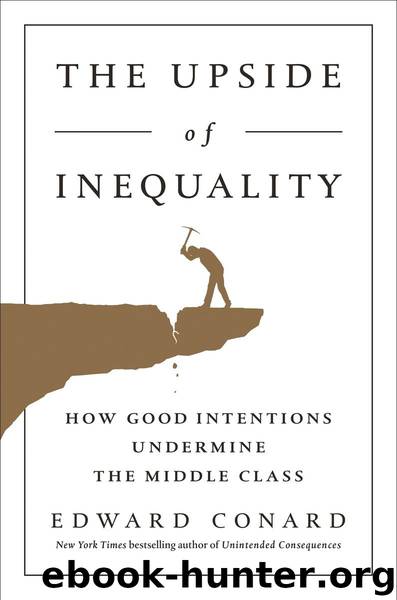The Upside of Inequality by Edward Conard

Author:Edward Conard
Language: eng
Format: epub
Publisher: Penguin Publishing Group
Published: 2016-09-01T15:15:15+00:00
Visit bit.ly/2bmbbTx for a larger version of this image.
It is hard to see how growing income inequality, and not competition for a smaller number of admission slots, is the predominant reason for competition. The 0.1 percent, where incomes have grown disproportionately, aren’t large enough to account for many children. And those children were already largely attending the most prestigious schools. More likely, increased competition is coming from upper-middle-class families, where the growth in income relative to the median has been fairly small. Competition for a smaller number of admission slots, not growing income inequality, has driven increased preparation.
Attending college is like running a marathon. It doesn’t matter much which marathon you enter. What matters is your time. Work by Princeton economist Alan Krueger finds that, except for the most disadvantaged students—that is, students who are the beneficiaries of affirmative action—students with the same test scores and other characteristics who graduate with a lower class ranking from a top college and those who graduate with a higher ranking from a less prestigious college achieve the same career success.43
Enrollment at less prestigious colleges has expanded to meet the growing demand of students with all levels of capability. When there is capacity to educate every student who is ready for college, and to test the capabilities at all skill levels with the most to the least demanding curriculum, it is illogical to complain that the rich are usurping opportunities from others. Quite the opposite—admission rates, enrollment, financial aid, and graduation rates of college students across all socioeconomic backgrounds have increased substantially.
In large part, college is a test of students’ preexisting capabilities—both their intellect and their discipline. A degree certifies that its holder is smart enough and diligent enough to graduate with a given class rank. Although separating a person’s capabilities from his or her accomplishments is obviously difficult, studies that attempt to separate these characteristics—often by comparing students with similar test scores and other relevant characteristics who graduate to those who fall just short—show that upwards of 50 percent of whatever value college adds comes from this credentialing.44
For marginal students graduating from marginal universities, especially if the students have studied marginally useful subjects such as psychology, sociology, English, or history, this credential may be of little value despite student hopes to the contrary. While a recent study shows college may have some value for marginal students,45 it is generally accepted that it may be of little value for these students, and that if anything, subsidized student loans and financial aid induce far more students to attend college than should (see Figure 6-7, “Value of Education to Marginal Students”).46
Credentialing is largely a zero-sum game. One person gains the value of a credential at another person’s expense. By overemphasizing the importance of college, we now demand average students earn a credential that proves they are merely average. That is, they now need a credential that proves they are not below average. That may be good for colleges and professors in the business of conferring credentials, but it is hardly obvious that this is in the best interests of average students.
Download
This site does not store any files on its server. We only index and link to content provided by other sites. Please contact the content providers to delete copyright contents if any and email us, we'll remove relevant links or contents immediately.
The Secret History by Donna Tartt(19092)
The Social Justice Warrior Handbook by Lisa De Pasquale(12190)
Thirteen Reasons Why by Jay Asher(8912)
This Is How You Lose Her by Junot Diaz(6887)
Weapons of Math Destruction by Cathy O'Neil(6281)
Zero to One by Peter Thiel(5802)
Beartown by Fredrik Backman(5755)
The Myth of the Strong Leader by Archie Brown(5508)
The Fire Next Time by James Baldwin(5447)
How Democracies Die by Steven Levitsky & Daniel Ziblatt(5219)
Promise Me, Dad by Joe Biden(5154)
Stone's Rules by Roger Stone(5088)
A Higher Loyalty: Truth, Lies, and Leadership by James Comey(4964)
100 Deadly Skills by Clint Emerson(4926)
Rise and Kill First by Ronen Bergman(4789)
Secrecy World by Jake Bernstein(4753)
The David Icke Guide to the Global Conspiracy (and how to end it) by David Icke(4720)
The Farm by Tom Rob Smith(4514)
The Doomsday Machine by Daniel Ellsberg(4490)
